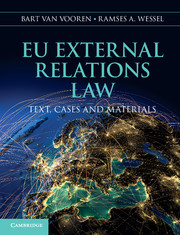Book contents
- Frontmatter
- Contents
- Table of cases
- Table of instruments and legislation
- Preface
- Acknowledgements
- List of abbreviations
- 1 The EU as a global legal actor
- 2 Instruments of EU external action
- 3 Existence of EU external competence
- 4 Nature of EU external competence
- 5 Scope and choice of EU external competence
- 6 The duty of cooperation
- 7 EU law and international law
- 8 The EU and international institutions
- 9 Common Commercial Policy
- 10 EU development policy
- 11 Common Foreign and Security Policy
- 12 Common Security and Defence Policy
- 13 The external dimension of the internal energy market
- 14 The external dimension of freedom, security and justice
- 15 The EU and its neighbours
- Index
- References
3 - Existence of EU external competence
- Frontmatter
- Contents
- Table of cases
- Table of instruments and legislation
- Preface
- Acknowledgements
- List of abbreviations
- 1 The EU as a global legal actor
- 2 Instruments of EU external action
- 3 Existence of EU external competence
- 4 Nature of EU external competence
- 5 Scope and choice of EU external competence
- 6 The duty of cooperation
- 7 EU law and international law
- 8 The EU and international institutions
- 9 Common Commercial Policy
- 10 EU development policy
- 11 Common Foreign and Security Policy
- 12 Common Security and Defence Policy
- 13 The external dimension of the internal energy market
- 14 The external dimension of freedom, security and justice
- 15 The EU and its neighbours
- Index
- References
Summary
Central issues
The EU possesses legal personality and capacity to act as a legal subject in international relations. However, the EU cannot undertake whatever international action it wishes. Its capacity is governed by the principle of conferral laid down in Article 5 TFEU, which states that the Union shall act within the powers conferred on it by the Member States. As regards external competence of the Union, we distinguish between the existence, nature and scope of that power.
In this chapter we examine the conditions under which competence to act externally will exist for the Union. First, this is the case when the Treaty expressly confers such external competence on the Union. Second, such competence may also be implied when, pursuant to the ERTA principle, the EU has adopted internal rules on the basis of expressly conferred internal powers; or when, pursuant to the complementarity principle, in the absence of internal rules, it is necessary to attain an EU Treaty objective for which the Treaty confers upon the Union an internal power. Third, when none of the above-mentioned sources are available, recourse to Article 352 TFEU is possible if this is necessary to attain objectives set for the Union in the EU Treaties.
Political battles between the institutions and Member States over international presence and representation have regularly translated into litigation concerning the question of whether the EU actually has competence at all. In resolving these conflicts, the CJEU has shown itself sensitive to the legal–political context of European integration in which the legal proceedings took place. At times borderline activist, at other times protective of Member States’ sovereignty, the role of the CJEU in this area of law, and consequently in the development of the EU as an international actor, cannot be understated.
- Type
- Chapter
- Information
- EU External Relations LawText, Cases and Materials, pp. 74 - 98Publisher: Cambridge University PressPrint publication year: 2014

